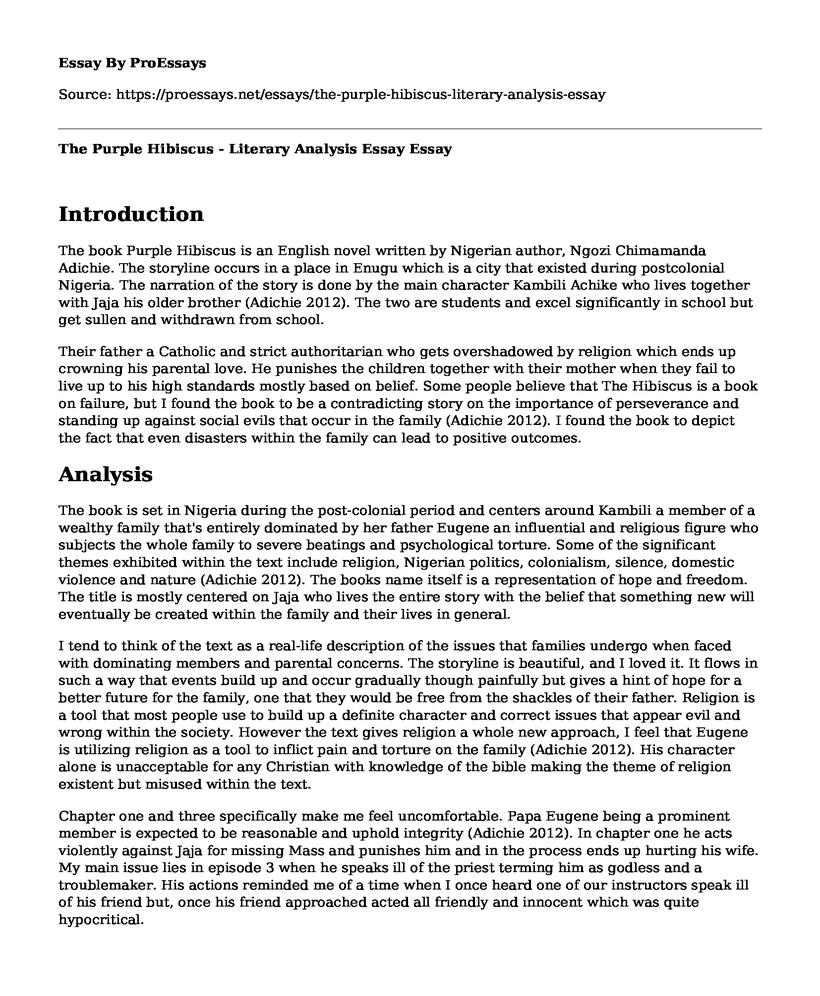Introduction
The book Purple Hibiscus is an English novel written by Nigerian author, Ngozi Chimamanda Adichie. The storyline occurs in a place in Enugu which is a city that existed during postcolonial Nigeria. The narration of the story is done by the main character Kambili Achike who lives together with Jaja his older brother (Adichie 2012). The two are students and excel significantly in school but get sullen and withdrawn from school.
Their father a Catholic and strict authoritarian who gets overshadowed by religion which ends up crowning his parental love. He punishes the children together with their mother when they fail to live up to his high standards mostly based on belief. Some people believe that The Hibiscus is a book on failure, but I found the book to be a contradicting story on the importance of perseverance and standing up against social evils that occur in the family (Adichie 2012). I found the book to depict the fact that even disasters within the family can lead to positive outcomes.
Analysis
The book is set in Nigeria during the post-colonial period and centers around Kambili a member of a wealthy family that's entirely dominated by her father Eugene an influential and religious figure who subjects the whole family to severe beatings and psychological torture. Some of the significant themes exhibited within the text include religion, Nigerian politics, colonialism, silence, domestic violence and nature (Adichie 2012). The books name itself is a representation of hope and freedom. The title is mostly centered on Jaja who lives the entire story with the belief that something new will eventually be created within the family and their lives in general.
I tend to think of the text as a real-life description of the issues that families undergo when faced with dominating members and parental concerns. The storyline is beautiful, and I loved it. It flows in such a way that events build up and occur gradually though painfully but gives a hint of hope for a better future for the family, one that they would be free from the shackles of their father. Religion is a tool that most people use to build up a definite character and correct issues that appear evil and wrong within the society. However the text gives religion a whole new approach, I feel that Eugene is utilizing religion as a tool to inflict pain and torture on the family (Adichie 2012). His character alone is unacceptable for any Christian with knowledge of the bible making the theme of religion existent but misused within the text.
Chapter one and three specifically make me feel uncomfortable. Papa Eugene being a prominent member is expected to be reasonable and uphold integrity (Adichie 2012). In chapter one he acts violently against Jaja for missing Mass and punishes him and in the process ends up hurting his wife. My main issue lies in episode 3 when he speaks ill of the priest terming him as godless and a troublemaker. His actions reminded me of a time when I once heard one of our instructors speak ill of his friend but, once his friend approached acted all friendly and innocent which was quite hypocritical.
Conclusion
Eventually, Jaja's mother makes a move and poisons Eugene and Jaja takes the blame and ends up being sent to prison. The prison life hardens Jaja and trains him never to expect a favorable outcome. I could feel the themes of action and reaction that ran through my mind at that moment echoing through my mind on survival and suffering. The text has secured within me a valuable lesson and understanding on the purpose of the "why" in life.
Work Cited
Adichie, Chimamanda Ngozi. Purple hibiscus: a novel. Algonquin Books, 2012.
Cite this page
The Purple Hibiscus - Literary Analysis Essay. (2022, Aug 10). Retrieved from https://proessays.net/essays/the-purple-hibiscus-literary-analysis-essay
If you are the original author of this essay and no longer wish to have it published on the ProEssays website, please click below to request its removal:
- Colonial Times: Personal Response to Early American Literature
- An Occurrence at Owl Creek Bridge and Recitatif Literal Analysis
- Critical Essay on The Scarlet Letter: Analysis of Pearl and How She Functions
- Essay Example on Life: Contrasting Perspectives in An Arundel Tomb & Ozymandias
- Character Analysis Essay on Forrest Gump: A Protagonist Who Changed a Storyline
- Essay Example on The American Dream: Success Through Hard Work and Sacrifice
- Essay Example on Shakespeare Studies: Examining The True Law of Free Monarchies Using Character Approach







